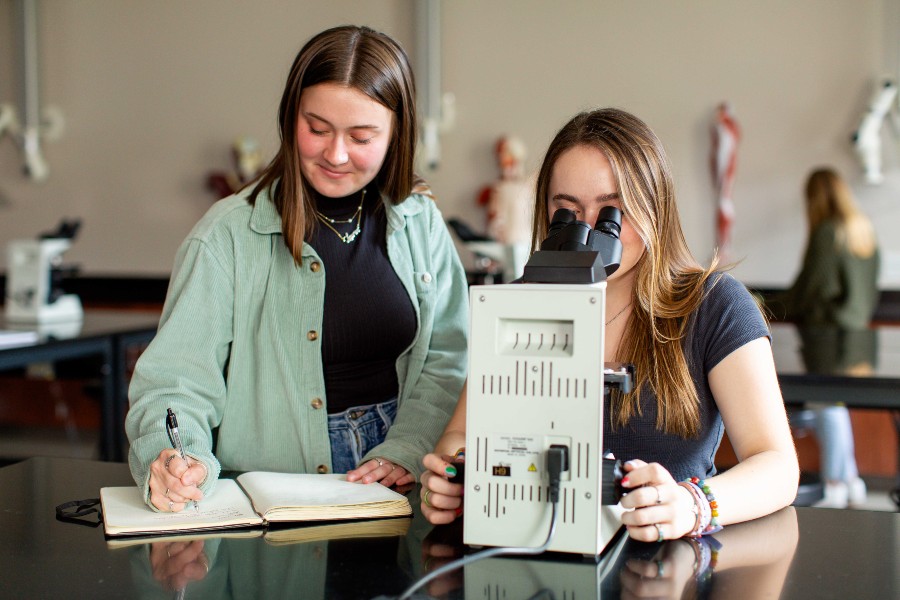Honors College gains national recognition
New honors curriculum, new resources contribute to designation as a Hidden Gem.
Janel Shoun-Smith | 615-966-7078 |

Lipscomb’s Honors College had a milestone year in 2023-24 with its director elevated to dean’s status, the program’s nascent liberal arts heritage curriculum contributing to national recognition for the program and renovations in the Honors House offering new opportunities for students.
This fall, the American Council of Trustees and Alumni (ACTA) designated Lipscomb University’s Honors College as a Hidden Gem, an honor that reflects, according to ACTA, “an unparalleled education in the liberal arts.” The liberal arts heritage curriculum, rolled out in fall 2022, was a major part of earning the Hidden Gem honor, bestowed on only 19 universities in the nation, said Alan Bradshaw, now dean of the Honors College.
“To be one of 19 schools in the nation chosen for this designation speaks volumes,” said Bradshaw. “It shows that people who recognize how important the liberal arts are, especially the humanities, are appreciative of what we are trying to do.”

Since its creation more than 30 years ago, the Honors College has always emphasized a strong foundation in the liberal arts, but previously the structure of the program tended to encourage students to concentrate the required 21 hours of honors courses into the general education curriculum provided within the first two years of a college education.
Working in line with the new Lipscomb Core curriculum (scheduled to supersede the existing general education curriculum in fall 2025), the honors’ heritage curriculum requires two non-literature humanities courses, one literature, one science, one society and perspectives course and one course in faith and reason, which allows students to apply their honors requirements as both underclassmen and upperclassmen, when they begin focusing on their major.
The new structure provides greater dimension to the honors education, said Bradshaw, allowing students to choose options that reinforce their chosen major at an honors study level.
For example, whereas previously a student may have taken an honors-level section of Great Ideas in History, a sophomore-level Western civilization course, today they may take the junior-level Twentieth Century Europe or History of Politics of Latin America to enhance a political science major or a humanitarian engineering minor.
“It really allows them to challenge themselves intellectually,” said Bradshaw, who began directing the Honors College in 2021. “We’ve had very good response from students and faculty, who appreciate having honors students in upper-level classes.

Underclassmen honors students are taking more upper-level courses during their freshman and sophomore years, and that dovetails nicely with much of the honors work they have already done in high school.”
With 350 to 400 active honors students at any one time, the Honors College has added some valuable resources in the past few years. A new program coordinator, Sydni Caldwell, joined Dean Bradshaw and Director Kristen Thompson in August 2023, and renovations to the upstairs kitchen in summer 2024 allows students to take on even more ownership of the Honors House, a multi-purpose space that serves as a study, classroom, hang-out and celebration space for honors students.
Bradshaw’s new role at the dean level “gives me the agency to develop a really significant vision for where the Honors College can go in the next few years and to carry out that vision,” he said.
“The Honors College is going to become a lot more involved in research and supporting undergraduates, both in and out of the Honors College, in making research a part of their experience,” he continued. “We are going to take a much more purposeful role in support of student scholars in general.”
The Honors College currently offers funding for students to travel to academic conferences, and in the future could establish a fund for small research projects, Bradshaw said. Ideas are being discussed about an honors’ level study abroad experience and how the Honors College can support the annual Student Scholars Symposium.

Through it all, Lipscomb’s Honors College will remain true to its founding as a program that challenges students to “excel beyond” standard general education courses and to be transformed through active participation in the liberal arts.
“ACTA’s Hidden Gems program are so named for the high caliber of their faculty, thoughtfully structured curricula and commitment both to the challenges and rewards of liberal education,” said Gabriella Hsu, ACTA’s senior program manager for curricular improvement. “
“Students enrolled in Hidden Gems programs are drawn into community and discussion rooted in the rich interdisciplinary study of the liberal arts and sciences,” she continued. “In its mission to support academic excellence, ACTA believes that the Hidden Gems program is an invaluable resource for students seeking a robust, collegial, and enriching education.”